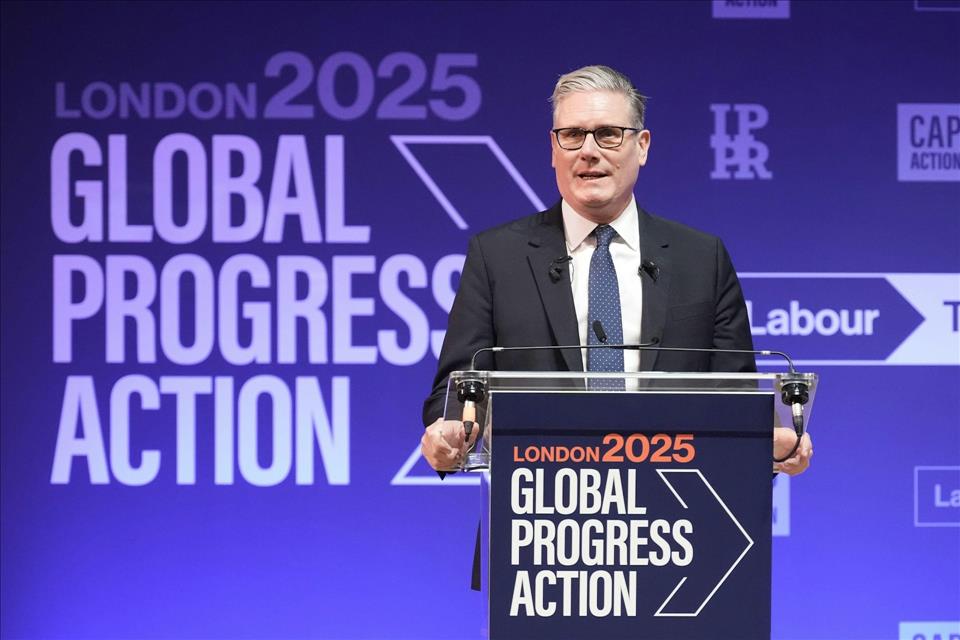Starmer Has Enabled The Far Right Promises Of 'Progressive Patriotism' Are No Longer Enough
Based on his government's actions and discourse so far, the signs are far from promising. He has helped embolden the very politics he claims to oppose.
Starmer's speech comes hot on the heels of Britain's largest ever far-right mobilisation. Between 110,000 and 150,000 people descended on London for the so-called“Unite The Kingdom” march, organised by Stephen Yaxley-Lennon (better known as Tommy Robinson).
In line with far-right great replacement theory, the principal target of those speaking at the event was Islam and immigration – but there were plenty of examples of placards targeting other marginalised groups such as LGBTQ+ people.
Appearing via video link, the billionaire oligarch Elon Musk warned of the need“to fight back or die” in the face of“massive uncontrolled migration”. Starmer's home secretary, Shabana Mahmood labelled Musk's words as abhorrent and Starmer said some of the views expressed at the rally did not reflect a“nation proudly built on tolerance, diversity and respect”. The government, however, arguably shares significant responsibility for legitimising the politics behind the rally.

An attendee at the Unite the Kingdom rally wearing a Make England Great Again hat. Alamy/Guy Corbishley
Starmer's denunciation of“loutish behaviour” mimics his decision to attribute the summer 2024 riots to“far-right thuggery”. Countering far-right figures such as Yaxley-Lennon is vitally important. However, on its own, such reactive discourse is not enough. Associating far-right ideas with the margins of society ignores the way in which so-called mainstream politicians have normalised such politics .
The Unite the Kingdom march was the climax of“operation raise the colours”, which saw people all over the country putting up flags wherever they felt like doing so. Bearing all the hallmarks of a carefully coordinated“astroturf” campaign (stimulating grassroots support for a cause and then using that support to legitimise other activities), raise the colours contributed to an emboldening of the far right .
Further to“just” raising the union flag and St George's cross, there were acts of vandalism against mosques and ethnic food restaurants as well as racist graffiti. It is hard not to also see the link between those putting up flags in the streets and those waving them outside so-called“asylum hotels”.
Attendees at the Unite the Kingdom rally in London. Alamy/Imago
Most of this has since been condemned by Starmer, yet he initially embraced raise the colours wholeheartedly, even calling himself a“big supporter of flags”. Meanwhile, the (at the time) home secretary Yvette Cooper made the somewhat bizarre assertion that her entire home was bedecked with St George's crosses and Union Jacks and said that people should “put 'em up anywhere” .
The violent rhetoric and actions on display at the rally reveal the severe limitations of this attempt to co-opt the flag waving initiative to attract its backers.
I would argue this also illustrates how Starmer's attempt to pivot towards a more“progressive” form of patriotism is doomed to fail. Because patriotism is so often tied to exclusion and the policing of national boundaries, it ultimately undermines broader commitments to empathy, equality and solidarity.
A losing gameIn the longer term, Starmer's own policies since taking office have tried to outflank Reform on the right. Starmer has framed Reform as Labour's official opposition. In line with this, the Labour party has made immigration, and Channel boat crossings in particular, one of its top priorities.
On taking office, Labour's prioritisation of“secure borders” has been encapsulated by the violent slogan of“smash the criminal gangs”. Starmer has accused past Conservative governments of running an“open-borders experiment” and has allowed images of deportations to be made public – a technique most notoriously used in the Trump administration's racially charged deportation videos that are shared with the public in the knowledge that they will be widely circulated on social media.
Starmer cannot defeat the far right by using its language and tactics. This much is evident not only in the chants and placards which target him at far-right rallies, but also his disastrous polling figures.
In the words of journalist Nesrine Malik, “we need new stories” when addressing the socioeconomic and sociopolitical challenges facing the UK. A key example is the way we talk about immigration. It is telling that just 5% of overall migration to the UK is classified as illegal yet it almost entirely dominates the national conversation.
Starmer has done nothing to counter that imbalance. Indeed, his speech, intended to mark a fightback of progressive values, has doubled-down on anti-migrant rhetoric.
In particular, the introduction of digital ID cards is framed as a way of ensuring Britain takes back control of its borders. Claiming Britain has been“squeamish” about talking about illegal immigration, Starmer has said ID cards would help protect working people's wages against those who“slip into the shadow economy and remain here illegally”.
Academic research consistently illustrates that the way in which immigration is framed by politicians and the media has a significant impact on how and whether people view it as a “legitimate concern” . It is incumbent on a supposedly“social democrat” prime minister to lead this change in narrative.
Starmer's intervention on the side of progressive values might be a welcome one, were it not premised on a dead duck narrative of“progressive patriotism”. It is, though, effectively meaningless if he continues to lead a government which oversees and manages the“division” he ostensibly seeks to address.
Want more politics coverage from academic experts? Every week, we bring you informed analysis of developments in government and fact check the claims being made.
Sign up for our weekly politics newsletter , delivered every Friday.

Legal Disclaimer:
MENAFN provides the
information “as is” without warranty of any kind. We do not accept
any responsibility or liability for the accuracy, content, images,
videos, licenses, completeness, legality, or reliability of the information
contained in this article. If you have any complaints or copyright
issues related to this article, kindly contact the provider above.
Most popular stories
Market Research

- Kintsu Launches Shype On Hyperliquid
- Barunson, Studio Behind Parasite, To Launch Nplug IP Remixing Platform On Story And Bring Flagship IP Onchain
- Moonbirds And Azuki IP Coming To Verse8 As AI-Native Game Platform Integrates With Story
- Leverage Shares Launches First 3X Single-Stock Etps On HOOD, HIMS, UNH And Others
- Alchemy Markets Launches Tradingview Integration For Direct Chart-Based Trading
- Dexari Unveils $1M Cash Prize Trading Competition






















Comments
No comment